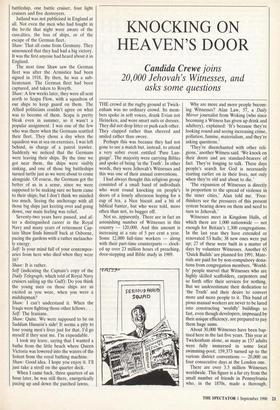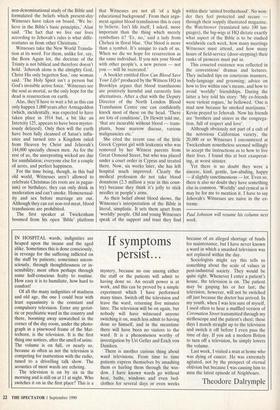KNOCKING ON HEAVEN'S DOOR
Candida Crewe joins 20,000 Jehovah's Witnesses, and asks some questions
THE crowd at the rugby ground at Twick- enham was no ordinary crowd. Its mem- bers spoke in soft voices, drank Evian not Heineken, and wore smart suits or dresses. They did not drop litter or push each other. They clapped rather than cheered and smiled rather than swore.
Perhaps this was because they had not gone to see a match but, instead, to attend a very sober event entitled 'Pure Lan- guage'. The majority were carrying Bibles and spoke of being 'in the Truth'. In other words, they were Jehovah's Witnesses and this was one of their annual conventions.
I had always thought this religious group consisted of a small band of individuals who went round knocking on people's doors of a lonely afternoon hoping for a cup of tea, a Nice biscuit and a bit of biblical banter, but who were told, more often than not, to bugger off.
Not so, apparently. There are in fact an astonishing number of Witnesses in this country — 120,000. And this amount is increasing at a rate of 5 per cent a year. Some 12,000 full-time workers — along with their part-time counterparts — clock- ed up over 23 million hours of preaching, door-stepping and Bible study in 1989. Why are more and more people becom- ing Witnesses? Alan Law, 57, a Daily Mirror journalist from Woking (who since becoming a Witness has given up drink and adultery), explained: 'It's because they're looking round and seeing increasing crime, pollution, famine, materialism, and they're asking questions.'
'They're disenchanted with other reli- gions,' another Witness said. 'We knock on their doors and are standard-bearers of fact. They're longing to talk. These days people's search for God is necessarily starting earlier on in their lives, not only when they're old and about to die.'
'The expansion of Witnesses is directly in proportion to the spread of violence in the inner cities,' Alan told me. 'Free- thinkers see the pressures of this present system bearing down on them and need to turn to Jehovah.'
Witnesses meet in Kingdom Halls, of which there are 1,000 nationwide — not enough for Britain's 1,300 congregations. In the last year they have extended or renovated 53. halls; 38 new ones were put up; 27 of these were built in a matter of days by volunteer Witnesses. Another 65 'Quick Builds' are planned for 1991. Mate- rials are paid for by non-compulsory dona- tions from congregation members. 'World- ly' people marvel that Witnesses who are highly skilled scaffolders, carpenters and so forth offer their services for nothing. But we underestimate their dedication to 'the Truth' and their desire to convert more and more people to it. This band of pious manual workers are never to be lured into constructing 'worldly' buildings so fast, even though developers, impressed by their unique efficiency, are prepared to pay them huge sums.
About 30,000 Witnesses have been bap- tised here in the last five years. This year at Twickenham alone, as many as 137 adults were fully immersed in some local swimming-pool; 159,373 turned up to the various district conventions — 20,000 on four consecutive days at the London one.
There are over 3.5 million Witnesses worldwide. This figure is a far cry from the small number of friends in Pennsylvania who, in the 1870s, made a thorough, non-denominational study of the Bible and formulated the beliefs which present-day • Witnesses have taken on board. 'We be- lieve in the Bible's basic principles,' Alan said. 'The fact that we live our lives according to Jehovah's rules is what diffe- rentiates us from other Christians.'
Witnesses take the New World Transla- tion at its word. For them, unlike for, say, the Born Again lot, the doctrine of the Trinity is not biblical and therefore doesn't hold. `Jehovah alone is the almighty God, Christ His only begotten Son,' one woman said. `The Holy Spirit isn't a person but God's invisible active force.' Witnesses see the soul as mortal, so the only hope for the dead is resurrection on earth.
Alas, they'll have to wait a bit as this can only happen 1,000 years after Armageddon (which, incidentally, was expected to have taken place in 1914 but, a bit like an Intercity 125, appears to have been myster- iously delayed). Only then will the earth have been fully cleansed of Satan's influ- ence and turned into a Kingdom ruled from Heaven by Christ and Jehovah's 144,000 specially chosen men. As for the rest of us, the unrepenting wicked are due for annihilation; everyone else for a couple of acres, and perfect happiness.
For the time being, though, in this bad old world, Witnesses aren't allowed to celebrate Christmas (its roots are in pagan- ism) or birthdays; they can only drink in moderation and can't smoke. Homosexual- ity and sex before marriage are out. Although they can eat non-red meat, blood transfusions are prohibited.
The first speaker at Twickenham boomed from his open `Bible' platform that Witnesses are not all 'of a high educational background'. From their argu- ment against blood transfusions this is easy to believe. Isn't life itself, I asked, more important than the thing which merely symbolises it? 'Er, no,' said a lady from Chelsea in floral blue. 'Our blood is more than a symbol. It's unique to each of us. When we die we hope for resurrection as the same individual. If you mix your blood with other people's, a new person — not you — will be recreated.'
A booklet entitled How Can Blood Save Your Life? produced by the Witness HQ in Brooklyn argues that blood transfusions are positively harmful and earnestly lists alternatives. After a chat with the Deputy Director of the North London Blood Transfusion Centre one can confidently knock most of these on the head. 'There are lots of conditions', Dr Hewitt told me, `that are incurable without blood — trans- plants, bone marrow disease, various malignancies etc.'
She cited the recent case of the little Greek Cypriot girl with leukemia who was removed by her Witness parents from Great Ormond Street, but who was placed under a court order in Cyprus and treated there. Now, six weeks later, she has left hospital much improved. Clearly the medical profession do not take blood donations (2.5 million a year in this coun- try) because they think it's jolly to stick needles in people's arms.
As their belief about blood shows, the Witnesses's interpretation of the Bible is literal, simplistic. It sets them apart from `worldly' people. Old and young Witnesses speak of the support and trust they find within their 'united brotherhood'. No won- der they feel protected and secure through their soppily illustrated magazine, the Watchtower (translated into 100 lan- guages), the big-wigs at HQ dictate exactly what aspect of the Bible is to be studied worldwide each week, how many meetings Witnesses must attend, and how many hours of field-service (door-stepping) their ranks of pioneers must put in.
This cosseted existence was reflected in the conventions' dramas and lectures. They included tips on courteous manners, body-language and grooming; advice on how to live within one's means, and how to avoid 'worldly' friendships. During the latter a boy told his story: 'My ex-friends were violent rogues,' he bellowed. `One is mad now because he smoked marijuana.' Kevin prayed to Jehovah. Now his friends are 'brothers and sisters in the congrega- tion, full of respect and love'.
Although obviously not part of a cult of the notorious Californian variety, the 20,000 or so Witnesses I encountered at Twickenham nonetheless seemed willingly to accept the instructions as to how to live their lives. I found this at best exasperat- ing, at worst sinister.
Yet there is no doubt they were a sincere, kind, gentle, law-abiding, happy — if slightly sanctimonious — lot. Even so, there is also no doubt they have something else in common. 'Worldly' and cynical as it may be for me to mention it, I have to say Jehovah's Witnesses are naïve in the ex- treme.



















































 Previous page
Previous page